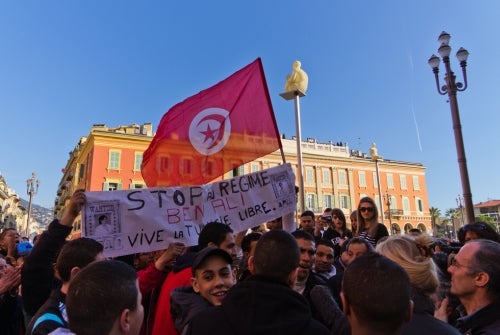 Ending abuse of power by the ruling elites was one of the chief demands of those who took to the streets during the Arab Spring protests. Our
new research paper unveils the scale of such abuse.
Ending abuse of power by the ruling elites was one of the chief demands of those who took to the streets during the Arab Spring protests. Our
new research paper unveils the scale of such abuse.
It documents evidence suggesting that firms owned by former President Ben Ali and his family were more likely to evade import tariffs during his tenure, circumventing at least 1.2 billion USD worth of taxes on account of their political connections between 2002 and 2009. Whereas under-reporting of taxes by firms previously owned by the Ben Ali family seems to have subsided since the Jasmin Revolution, overall evasion has escalated.
How do we know?
Verifying tax declarations is notoriously difficult. In the case of taxes on imported goods, however, counterpart declarations by exporters, which have limited incentives to lie about how much they have sold abroad, can be used to detect potential tax fraud.
If imports are reported correctly, they must be very close to exports reported in countries that send goods to Tunisia. However, if imports are declared incorrectly – or not at all – so-called “evasion gaps” may arise. These are measured as the difference between exports reported in countries selling goods to Tunisia and imports of those same goods reported in Tunisia; the higher this difference, the more imports are “missing” and the less revenue Tunisian customs collects. Such evasion gaps are typically largest for goods subject to high tariffs, for which evasion is most lucrative, and have become a standard proxy for tax evasion.
In Tunisia, evasion gaps were highest for products imported by Ben Ali owned firms, and especially large when such products were subject to high tariffs. These gaps were due to under-reporting of prices and the evidence suggests connected entrepreneurs were the main perpetrators; Ben Ali owned firms reported significantly lower prices as their competitors for the same goods imported from the same country (and consequently paid less tax for those same goods) with the gap between Ben Ali prices and other firms’ prices widening with the tariff rate.
Moreover, firms that were privatized started reporting significantly lower import prices if they were sold to the Ben Ali family, whereas reported unit prices were virtually unchanged when they were sold to non-connected entrepreneurs.
Why should we care?
At issue are not only inequity and fiscal losses, but also inefficiency since tariff evasion endows perpetrators with a cost advantage over those who are compliant that is not based on performance
What has happened after the revolution?
The Revolution led to a reduction in evasion and under-reporting of unit prices in product lines where the Ben Ali family had been active, but sparked an increase in evasion overall. In spite of curtailed capture by the Ben Ali clan, if anything, corruption has intensified. This leaves us with an important question: Did the revolution democratize corruption in Tunisia?
Please share with us any potential answers you might have.




Join the Conversation